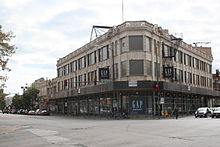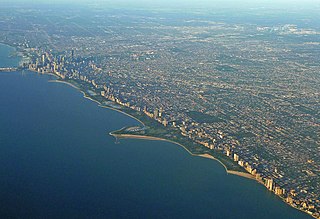
Lincoln Park is a 1,208-acre (489-hectare) park along Lake Michigan on the North Side of Chicago, Illinois. Named after US President Abraham Lincoln, it is the city's largest public park and stretches for seven miles (11 km) from Grand Avenue, on the south, to near Ardmore Avenue on the north, just north of the DuSable Lake Shore Drive terminus at Hollywood Avenue. Two museums and a zoo are located in the oldest part of the park between North Avenue and Diversey Parkway in the eponymous neighborhood. Further to the north, the park is characterized by parkland, beaches, recreational areas, nature reserves, and harbors. To the south, there is a more narrow strip of beaches east of Lake Shore Drive, almost to downtown. With 20 million visitors per year, Lincoln Park is the second-most-visited city park in the United States, behind Manhattan's Central Park.

Logan Square is an official community area, historical neighborhood, and public square on the northwest side of the City of Chicago. The Logan Square community area is one of the 77 city-designated community areas established for planning purposes. The Logan Square neighborhood, located within the Logan Square community area, is centered on the public square that serves as its namesake, located at the three-way intersection of Milwaukee Avenue, Logan Boulevard and Kedzie Boulevard.
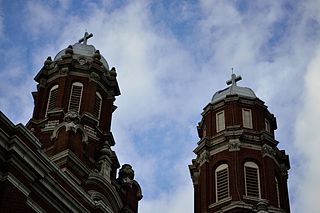
Avondale is one of Chicago's 77 officially designated community areas. It is on the Northwest Side of the city. The northern border is Addison Street from the north branch of the Chicago River in the east to Pulaski Road in the west. The neighborhood extends further west along Belmont Avenue to the Union Pacific/Northwest Line. Its southern border is Diversey Avenue from the Union Pacific/Northwest Line to the Chicago River.

Sheridan Road is a major north-south street that leads from Diversey Parkway in Chicago, Illinois, north to the Illinois-Wisconsin border and beyond to Racine. Throughout most of its run, it is the easternmost north-south through street, closest to Lake Michigan. From Chicago, it passes through Chicago's wealthy lakeside North Shore suburbs, and then Waukegan and Zion, until it reaches the Illinois-Wisconsin state line in Winthrop Harbor. In Wisconsin, the road leads north through Pleasant Prairie and Kenosha, until it ends on the south side of Racine, in Mount Pleasant.

Pulaski Road is a major north-south street in the city of Chicago, at 4000 W., or exactly five miles west of State Street. It is named after Polish hero of the American Revolutionary War Casimir Pulaski.

North Milwaukee Avenue is a street in the city of Chicago and the northern suburbs.

The Ukrainian Village District is a landmark-designated district of residential buildings within the West Town community area of Chicago, Illinois. It was designated a Chicago Landmark in 2002, with area extensions in 2005 and 2007.

The Chicago Defender Building, located at 3435 S. Indiana Avenue in the Black Metropolis-Bronzeville District of the Douglas community area of Chicago, Illinois, housed the Chicago Defender from 1920 until 1960. Designed by Henry L. Newhouse, it was originally a synagogue. The building was designated a Chicago Landmark on September 9, 1998.

The Black Metropolis–Bronzeville District is a historic African American district in the Bronzeville neighborhood of the Douglas community area on the South Side of Chicago, Illinois.

The Wicker Park District is a historic district in the West Town community area of Chicago, Illinois. It is the neighborhood bounded by Bell Avenue, Caton Street, Leavitt Street, Potomac Avenue and Chicago 'L' tracks. It was designated a Chicago Landmark on April 12, 1991.

The Wingert House is a nineteenth-century farmhouse located at 6231 North Canfield Avenue in Chicago, Illinois. One of the oldest surviving farmhouses within the Chicago city limits, the building received Chicago Landmark status on July 31, 1990. It is part of the Norwood Park neighborhood.

The Jewelers Row District is a historic district in the Loop community area of Chicago, Illinois in the United States. Running along Wabash Avenue, primarily between East Washington Street and East Monroe Street, the buildings in the district were built between 1872 and 1941 and were designed by many architects, including Graham, Anderson, Probst & White, John Mills Van Osdel, Adler & Sullivan, Alfred Alschuler, D. H. Burnham & Co., and Holabird & Roche in a variety of styles, including Italianate, Chicago School, and Art Deco. The buildings are variously loft buildings used for small manufacturers, mercantile buildings, office buildings and early skyscrapers.
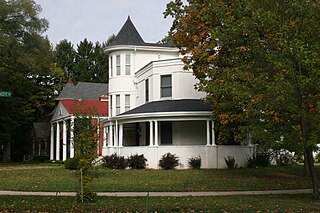
Old Edgebrook is a historic district and neighborhood in the Forest Glen community area of Chicago, Illinois, United States.
The Eliel House is a house at 4122 South Ellis Avenue in Chicago, Illinois, United States. The house was built in 1886 by Adler & Sullivan for Mathilde Eliel. It was designated a Chicago Landmark on October 2, 1991.

The Brewster Apartments is a residential building in the Lake View neighborhood of Chicago.
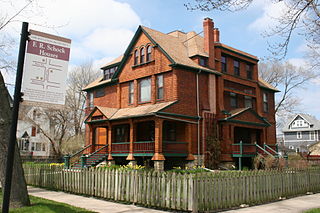
The Schlect House is a Shingle Style house at 5804 West Race Avenue in Chicago, Illinois, United States. The house was built in 1887 by Fredrick R. Schlock for his aunt Catherine Schlect. It was designated a Chicago Landmark on January 20, 1999.

The Marie Schock House is a Shingle Style house at 5749 West Race Avenue in Chicago, Illinois, United States. The house was built in 1888 by Fredrick R. Schock for his mother Marie Schock. It was designated a Chicago Landmark on January 20, 1999.

Illinois Centennial Memorial Column, Logan Square Monument or Illinois Centennial Monument is a public monument in the Logan Square community area and the Chicago Landmark and National Register of Historic Places-listed Logan Square Boulevards Historic District. Built in 1918 to celebrate the 100th anniversary of Illinois' statehood, the monument, designed by Henry Bacon, famed architect of the Lincoln Memorial in Washington, DC, is a single 70-foot (21 m) tall marble Doric column topped by an eagle, in reference to the Flag of Illinois. Reliefs surrounding the base depict figures of Native Americans, explorers, farmers and laborers intended to show the great changes experienced during the state's 1st century. Although Bacon designed the main column, Evelyn Beatrice Longman designed and sculpted the reliefs.
The Hairpin Arts Center is a community art center in the historic Morris B. Sachs building within the Chicago Community Area of Avondale at the gateway to Chicago's Polish Village. The space is managed by the Logan Square Chamber of Arts, a 501(c)(3) not-for-profit established in 2009.
